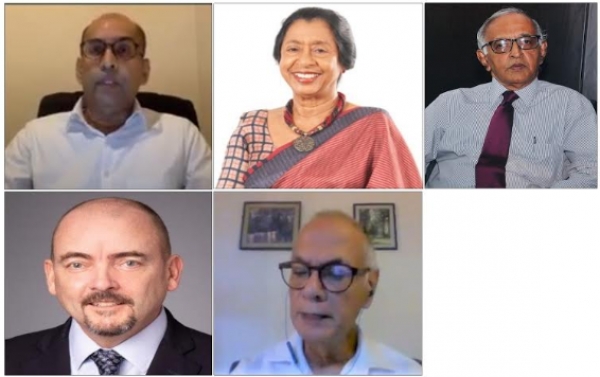The Covid-19 outbreak and the economic shutdown it precipitated has created immensely challenging circumstances for Companies.
The INED (Independent Non-Executive Directors) Forum of the Sri Lanka Institute of Directors (SLID), which has consistently focused on the role and responsibilities of INEDs and the skills required of them, recently held a webinar to discuss INEDs roles and responsibilities during the present crisis, and how they could help steer the company through and beyond it. The panelists for this session were Rose Cooray-- Former Deputy Governor of the Central Bank of Sri Lanka and current Chairperson of a listed company, Nick Robinson - Partner, EY (Hong Kong), Richard Ebell - Independent Executive Director and Eardley Perera – Independent Executive Director moderated by Faizal Salieh, Senior Vice Chairman of SLID. While the pandemic has eclipsed other recent crises in size and scope, Board Directors have been called on to act promptly as part of the Company’s “Leadership Response”.
“Considering the implications of Covid-19 from a strategic perspective, it is important for organizations (and INEDs) to understand the many dangers posed. These range from cyber-attacks and data loss to misappropriation of assets and money laundering. The challenges posed by Covid-19 present heightened risks of fraud” said Nick Robinson and highlighted misappropriations of assets and fraudulent financial reporting as areas requiring high levels of attention from Boards and INEDs.
On strategy in responding to these exceptional circumstances, two aspects – opportunity and resilience – will be crucial. Often consideration of these must be simultaneous, with resilient leadership enabling companies to emerge stronger.
“It is up to the Chairperson to provide leadership to the Board for steering the Company through this difficult time and ensuring business continuity and long term success. Full understanding of the ground situation, including the evolving needs of the company on processes and human resources is crucial, while INEDs continue to be watchdogs for good governance” said Rose Cooray sharing her insights on required leadership responses.
Against this extraordinary backdrop of events Richard Ebell said “organizations in the midst of a crisis are faced with many urgent issues, some common and some industry- specific, but it was not all gloom” and encouraged management to focus on these, establishing priority areas and opportunities that can be built on.
Salieh noted that the leadership response from executive management could be different from that of the Board, and INEDs should help build congruence between the two.
Recognizing that companies are in different phases of dealing with the outbreak, panelist Eardley Perera expressed his views on the role of INEDs in reimagining and reinventing the company’s future and said “INEDs complemented the Board in mapping overall strategic direction and supplemented the Board with specialized skills”. Taking a practical approach, he added that it is of crucial importance for companies to map the risks and opportunities apparent, and act to mitigate risks and leverage new opportunities available.
“Governance cannot be compromised and required the same or higher levels of attention from the Board under these crisis conditions. A company’s commitment to Governance depended on its culture. A crisis will not deter companies with the right culture from ensuring good governance practices” he added reiterating the importance of Governance.
In the face of challenges and risks, companies have set up Emergency Response Teams including Non-Executive and Executive Directors to provide insight and direction when taking action. Commenting on the role of an INED in such a team, Nick Robinson said “a crisis will not reduce the level of responsibility required of an INED. Their experience and specialized skills can add immense value in balancing the interests of all stakeholders in the Company”.
Taking a different view, Richard Ebell said “crisis situations such as Covid-19 could expose shortcomings of Boards, particularly in their composition. Common INED traits such as a lack of understanding of the dynamics of the Company could cause inertia, whose effects could be compounded by the existence of ‘Boards within Boards’”.
On the issue of the size and scope of cost cutting versus investing for the future, moderator Salieh asked what the contribution of INEDs should be to this difficult Board conversation. Considering recent statements made by Sri Lanka Companies on reduction of cadre and salary cuts, Rose Cooray said these measures were right at the bottom of the agenda of the Company she headed. She said expansion and investment proposals were being evaluated instead.
In the current crisis, many leadership teams may engage in survival thinking only. Few may try to identify a landing zone providing the opportunity to take off effectively again. In that context, how Boards react to the present crisis is very telling. Agility is indeed being tested, as are the abilities of Directors, who face unprecedented challenges not seen before.




